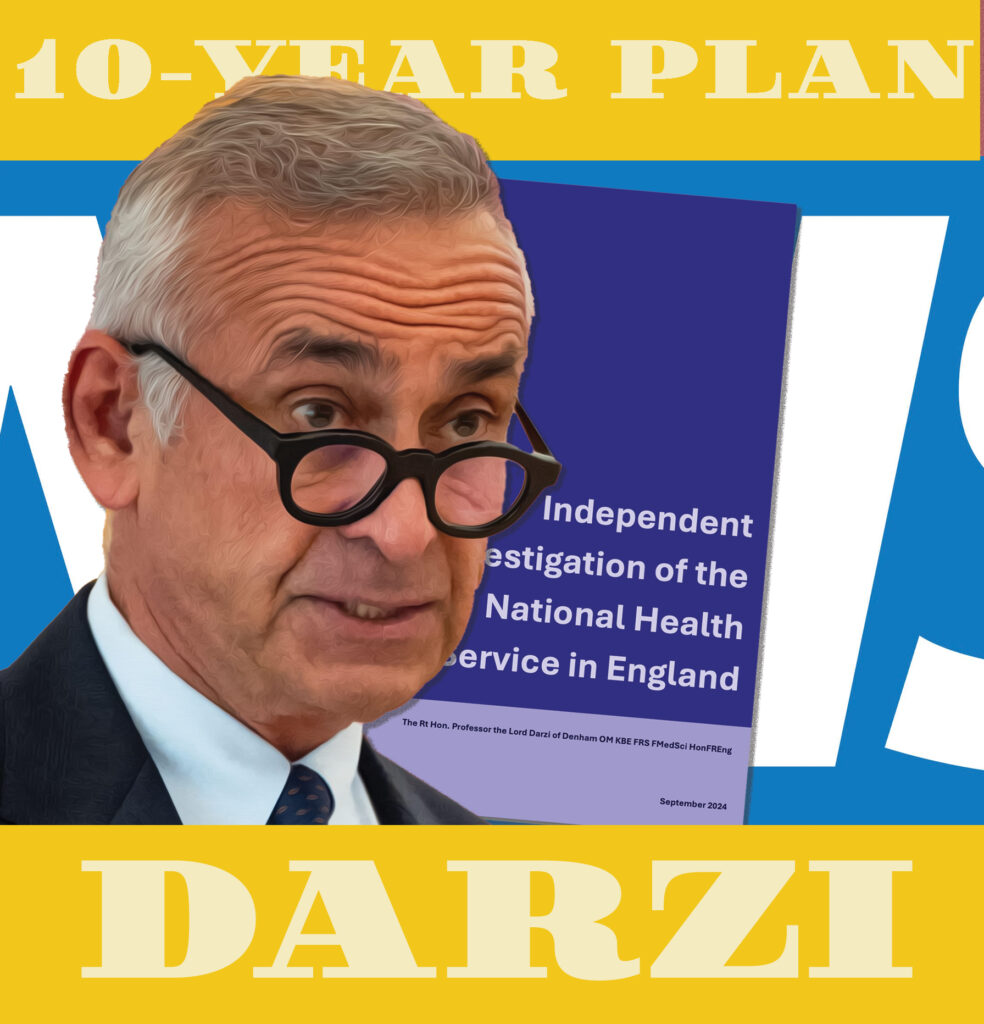Darzi’s ardent defence of NHS managers offers a fresh start as government embarks on historic reforms
With his blunt dismissal of those who blame managers for the NHS’s troubles, Lord Darzi drew a line under decades of manager-bashing and scapegoating. It’s time to move on, and for managers to work with clinicians to tackle the real problems facing the NHS, write Jon Restell and Rhys McKenzie.

When the newly appointed health secretary, Wes Streeting, announced that ex-Labour health minister and current independent peer Lord Darzi would be conducting a “raw and frank” assessment of the NHS in England it left many managers with a strong sense of deja vu: another hastily arranged, ‘independent’ insight uncovering what most NHS managers could tell the government in a five-minute phone call. It was met with a fair amount of apathy in the health system: how many more times do we need to diagnose the problem before we start to treat it?
The review was conducted, written and published in just one month, adding to the sense that this was more about politics than policy. But while Darzi’s findings bought the government some much needed time while it figured out what ‘NHS reform’ actually meant, it was Darzi’s ardent defence of managers that really caught them by surprise.
While laying out all of the NHS’s struggles over the past 14 years, Darzi was categorically clear: “some have suggested this is primarily a failure of NHS management. They are wrong,” he wrote.
This should not really be a revelation. Many reports and reviews on our healthcare system have drawn similar conclusions. But the way in which Darzi tears apart this notion of management failure after being given free rein by government to “uncover the hard truths” plaguing the health service, should convince us to accept it.
Lansley and the ‘lost decade’
Darzi’s key finding was that the NHS is in “critical condition but its vitals are strong”. A slightly more optimistic prognosis than the health secretary’s blunt top line that the “the NHS is broken”. The critical condition the NHS finds itself in, Darzi says, is caused in large part by reforms that were intended to save it.
Every good story needs a strong antagonist. Enter Andrew Lansley, the reforming Conservative health secretary whose plan to “liberate the NHS” almost destroyed it. His reforms were eviscerated by Darzi who called them “a calamity without international precedence”.
Darzi’s scathing verdict on the Health and Social Care Act 2012, a piece of legislation that was three times the size of the 1946 act which founded the NHS, should serve as a cautionary tale to reforming governments.
Its “scorched earth” approach to management structures resulted in a permanent loss of management skills and capacity, the effects of which are still felt today. Lansley opted to abolish three tiers of management at the same time, dissolving the entire management line of the NHS. It resulted in the creation of over 300 new NHS organisations in a five-year period, in a completely new structure and operational environment. With even the most talented managers in the world, no health system could be expected to build up such a large number of organisations in such a short period.
As managers struggled to make sense of this nonsensical move, they became the scapegoats for ministers looking for someone else to blame. The reforms were “a political decision, that not only condemned the NHS to a lost a decade, but condemned its managers to a decade of finger-pointing and political attacks,” says MiP chief executive Jon Restell.
Too much oversight
Lansley was also the driver for a near-constant reorganisation of the headquarters and regulatory functions of the NHS. The number of staff employed in central and regulatory functions of the health service has expanded massively compared to providers. The size of the Department for Health and Social Care (DHSC) has increased by over 50% since 2013 and the number of staff working in regulatory roles is now more than 35 per trust, up from just five in 2007.
Darzi is quick to point out, and MiP agrees, that this is not a criticism of the people working in these roles. But the increase in oversight undoubtedly puts a strain on the managers and leaders further down the system. Accountability is important. But too many people holding each other to account, rather than focussing on delivering, can be counterproductive.
“When you’re looking up, you’re not looking out,” says Restell. “The NHS as a national health system requires a strong centre to operate effectively, but many managers in providers spend too much time on internal management duties rather than using their skills to improve services locally. A few targets can focus the mind and ensure each part of the system is working towards a common objective, but too many can make it difficult to remember who you are there to deliver for – the patient.”
Darzi argued that “the problem is not too many managers” but too few in the right parts of the system to be as effective as they can be. But with NHS England, ICBs and a large number of trusts going through organisational change in the last few years, there is no appetite for more reorganisation. MiP understands how costly and distracting these exercises can be, and how they demoralise and demotivate staff.
Darzi, thankfully, says that reorganisation is neither “desirable nor necessary”, especially as our health system is beginning to resemble a more sensible structure after the 2022 Health and Social Care Act. But in lieu of restructuring, MiP agrees with Darzi that government should do more to clarify roles and accountabilities throughout the system.
Managers drive efficiency
Darzi’s review also highlighted how the loss of managers has reduced the efficiency of the NHS. Manager numbers fell at an annual rate of 4% between 2010 and 2015, and only began to grow from that low base in the last two years. The number of managers per clinician has also fallen, putting more of the management burden on clinical staff.
Clinicians taking on more management responsibilities to plug this gap then find themselves in the strange position of being “lauded in one capacity and demonised in another”. The irony was not lost on Darzi.
Senior manager numbers are recovering at a faster rate than managers generally, although Darzi highlights how this resource could be wasted: “tasks must be delivered as well as set,” he writes, “and it implies some managers may lack the teams they need to deliver’. It may be uncomfortable for the government, but Darzi is taking on the elephant in the room: can we really get away with ignoring manager numbers for much longer?
Darzi’s review pointed out what all of us knew for some time. The NHS is struggling due to an unprecedented and wholly unnecessary top-down restructure in 2013, a lack of funding, especially in capital, going back 14 years, a pandemic we were woefully unprepared for and a failure to shift resources from the hospital to the community. Its analysis of the problems will be used by government as a mandate to conduct its reforms. But in its identification of fault, it has also set out one of the most compelling rebuttals of NHS manager-bashing in years.
We must move on now. As Darzi has highlighted, the NHS will only recover because of managers, not in spite of them. They need support and need a government who sees them as partners rather than an opportunity to score quick political points. //
Related Stories
-

NHS job cuts: you’ll never walk alone
As the NHS redundancies in England loom, Rhys McKenzie explains how MiP will back you, and how members supporting each other and acting collectively is the best way to navigate this difficult process.
-

What now? Seven expert takes on the Ten-Year Plan
The government’s Ten-Year Plan for the NHS in England has met with enthusiasm and exasperation in equal measure. We asked seven healthcare experts to give us their considered view on one aspect that interests, excites or annoys them.
-

NHS job cuts: what are your options?
When politicians start reforming the NHS, there is only one certainty: some people will lose their jobs. But what options might be on the table and how does redundancy work? Corrado Valle explains.
Latest News
-

Government proposal for sub-inflation pay rise “not good enough”, says MiP
Pay rises for most NHS staff should be restricted to an “affordable” 2.5% next year to deliver improvements to NHS services and avoid “difficult” trade-offs, the UK government has said.
-

Unions refuse to back “grossly unfair” voluntary exit scheme for ICB and NHS England staff
NHS trade unions, including MiP, have refused to endorse NHS England’s national voluntary redundancy (VR) scheme, describing some aspects of the scheme as “grossly unfair” and warning of “potentially serious” tax implications.
-

Urgent action needed retain and recruit senior leaders, says MiP
NHS leaders are experiencing more work-related stress and lower morale, with the government’s sweeping reforms of the NHS in England a major factor, according to a new MiP survey.